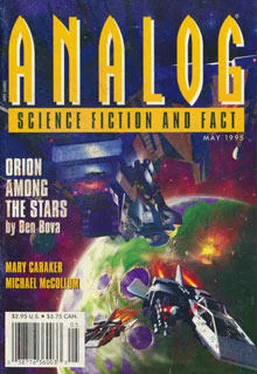Christopher McKitterick - Paving the Road to Armageddon
Здесь есть возможность читать онлайн «Christopher McKitterick - Paving the Road to Armageddon» весь текст электронной книги совершенно бесплатно (целиком полную версию без сокращений). В некоторых случаях можно слушать аудио, скачать через торрент в формате fb2 и присутствует краткое содержание. Год выпуска: 1995, Издательство: Dell Magazines, Жанр: Фантастика и фэнтези, на английском языке. Описание произведения, (предисловие) а так же отзывы посетителей доступны на портале библиотеки ЛибКат.
- Название:Paving the Road to Armageddon
- Автор:
- Издательство:Dell Magazines
- Жанр:
- Год:1995
- ISBN:нет данных
- Рейтинг книги:3 / 5. Голосов: 1
-
Избранное:Добавить в избранное
- Отзывы:
-
Ваша оценка:
- 60
- 1
- 2
- 3
- 4
- 5
Paving the Road to Armageddon: краткое содержание, описание и аннотация
Предлагаем к чтению аннотацию, описание, краткое содержание или предисловие (зависит от того, что написал сам автор книги «Paving the Road to Armageddon»). Если вы не нашли необходимую информацию о книге — напишите в комментариях, мы постараемся отыскать её.
Paving the Road to Armageddon — читать онлайн бесплатно полную книгу (весь текст) целиком
Ниже представлен текст книги, разбитый по страницам. Система сохранения места последней прочитанной страницы, позволяет с удобством читать онлайн бесплатно книгу «Paving the Road to Armageddon», без необходимости каждый раз заново искать на чём Вы остановились. Поставьте закладку, и сможете в любой момент перейти на страницу, на которой закончили чтение.
Интервал:
Закладка:
He then told the captain of the guards which Americans were to stay, and which could leave. The Soviet hesitated.
“If you doubt me, get confirmation from Vebretsky,” he declared.
So five of the American officers remained while the rest took off amid an escort of Russian long-range fighters. Eight days later began the trickle of American scientists, then a clutch of Canadians and a few men and women from all around the globe. They came from wherever bombs and missiles were made, wherever visionaries were forced to put aside their dreams of space and concentrate on death.
Then came the spectacular aeronautical feat of the Brit who appeared on the Russian radar net, piloting a Bellthunder over Soviet airspace.
One predawn morning the rocket plane descended like a meteor toward the Plesetsk landing field stirring up every aircraft parked there like a flock of scared geese. Emergency rescue vehicles were readied. So were AA guns and ground-to-air missiles. The Station held its collective breath during the fiery last few minutes of descent: Will an atomic bomb fall with the plane? Will it crash-land atop the half-constructed prototype rocket? Is the pilot crazy, deadly sane, or a daredevil who wants out of the war?
Through a frost-webbed window in their apartment block, waiting wordless, Goddard, Esther, von Braun and another German watched the fireball cascade from the starry sky. One minute, two… an eternity was swallowed up in the waiting.
“It couldn’t be carrying a bomb,” Goddard speculated. “Range would be limited by the weight. It must be carrying extra fuel instead.”
“Perhaps extra fuel and a bomb,” von Braun added.

But the plane landed without incident, except that it ruined its undercarriage, and its wings and tail had practically been burned off. The British pilot, Ethan Harper, staggered out of the cockpit, grinning. He explained to a hastily gathered group at Design Headquarters how he had crammed spare fuel and oxidizer tanks into the bomb bay the previous day, explaining to the British West Afrikan Air Corps that it was a test of maximum speed flight to Britain. To see if the new German secret weapon—which had knocked out a Bellthunder a few months before—could hit him going that fast.
The next morning, the engineers gathered to study the badly scorched craft. The Germans, especially, approached it with trepidation, as if it could go off and vaporize the Cosmodrome as it had done to large sections of two Europareich cities and several manufacturing centers. But it was only a machine, and its pilot only a starved defector.
“I wan’ be the first bloody cosmonaut!” Harper laughed to the gathering of scientists who regarded him warily. “So I thought I’d better prove my mettle.
“I was in space, chaps!” he said, then turned his face toward the crisp blue sky framed by a purple and red sunrise. He continued:
“It’s quiet. You can’t hear the bleedin’ rhetoric comin’ from the shambles of Parliament—‘We shall not have suffered in vain! Remember Dunkirk! Remember Brighton, remember Portsmouth, remember Westminister,’ and on and on. It’s like the Great War all over again, as if nobody learned a thing. What’s left in England to fight for? Let’s just smash the rest for vengeance! It makes me sick.
“Ah, but space…. You can see the whole world spinnin’ beneath you, like a little ball with a skin of air stuck to it. You can’t even see any bleedin’ borders from up there, not even whole armored infantry divisions or cities.” He sounded wistful.
“Nothin’ like it. Sign me up.”
Then came the flood of emigres to the Space Mecca. The Europareich refused to be left out of something of which even their blackest enemy was part. The Americans couldn’t allow the Reich to be part of a worldwide movement without a hefty contingent of their own, and so on across the continents. There were no U-boat or Luftwaffe incidents.
By July, Zhukov had to issue a limit as to how many members could come from each country, calculated as a tiny percentage of each nation’s population as well as how much money and material they were willing to supply.
Only one serious conflict arose at Plesetsk Station. Von Braun and Goddard, as well as most of the engineers, demanded that each redesigned engine be static-tested before approval for installation into a rocket.
“You waste time!” Vebretsky yelled in his hollow voice. “We already know motors safe. You waste fuel! You wear out motors!”
“Talk about wasteful!” von Braun screamed back. “Do you think it wiser if we install faulty engines into our rocket and blow it to pieces, along with half the Cosmodrome?”
“You will have no static tests,” the Colonel declared.
Goddard decided to end the stalemate, risking all: “I will not remain part of this effort if we do not static-test each engine with all its components. I will not be part of any disaster you wish to bring about, Colonel.”
“I am in command here!” Vebretsky howled. Goddard quieted his internal twisting, at least remaining calm on the exterior:
“Unless we proceed intelligently, you will have no command.”
The Soviet Colonel’s face filled black with blood. But the argument had ended.
There were no more denials of static tests—and the engineers’ demand proved itself in the end: Only nine days after the power struggle, a motor exploded on its test stand. It was discovered that its turbopump’s bearings had fused. All turbopumps to be used in the rockets would receive better-oiled bearings.
On August 27, 1946, the world’s first spaceship was shipped—in three liquid-fuel stages, a trio of external solid-fuel boosters, and an elongated cylinder-and-cone payload section—by rail from Moscow to Plesetsk Station, where the first stage was fitted with five mighty WUR-4 engines and their associated piping and pumping apparatus, the second with three, and the third stage with a single engine. From there, the sections were trucked across swampy land and numerous bridges to the Cosmodrome. Even as it was being assembled on its pad, the next rocket was being manufactured in a secret plant or plants near Moscow.
Goddard stood, swatting at flies and insects, with an arm around Esther, watching the final preparations. The rocket pointed skyward 110 feet from the base of its launching pad, four tapering sections balanced— precariously, Goddard thought, imagining the vast forces of propulsion that would soon blast the stack into space—atop one another like an overgrown V2, only proportionally narrower. Three fins flared at its base, topping five nozzles which barely peeked out from beneath gleaming aluminum skin. Three squat arrows, the solid boosters, clung to the behemoth’s waist, just fitting in the gaps between the pad’s three collapsible catwalk arms which would fill the rocket’s hungry appetite moments before launch.
“I feel like a proud father,” Goddard told his wife, turning a glowing countenance to her. She smiled back, solemn in the face of a great moment, strong as always.
“I feel as if I’ve helped foster a new generation of humans,” he went on. “As if I’ve finally fulfilled my destiny.” He winced at a cramp in his abdomen.
“Are you all right?” Esther asked. “Was that another stomach pain?” Goddard inhaled deeply, exhaled slowly.
“I’m OK,” he answered. And he was.
The countdown sounded as if it were being narrated by the gang who built the Tower of Babel. Each number echoed in two dozen languages before the next was spoken, stretching the count’s length and building anticipation. This, along with the next ten launches, would be unmanned, carrying supplies which the later-manned stations would assemble into orbital facilities. Eventually, the engineers planned, orbiting factories would build more rockets to first explore and then take supplies to the Moon; there, manned missions would follow to build bases and more factories…
Читать дальшеИнтервал:
Закладка:
Похожие книги на «Paving the Road to Armageddon»
Представляем Вашему вниманию похожие книги на «Paving the Road to Armageddon» списком для выбора. Мы отобрали схожую по названию и смыслу литературу в надежде предоставить читателям больше вариантов отыскать новые, интересные, ещё непрочитанные произведения.
Обсуждение, отзывы о книге «Paving the Road to Armageddon» и просто собственные мнения читателей. Оставьте ваши комментарии, напишите, что Вы думаете о произведении, его смысле или главных героях. Укажите что конкретно понравилось, а что нет, и почему Вы так считаете.












